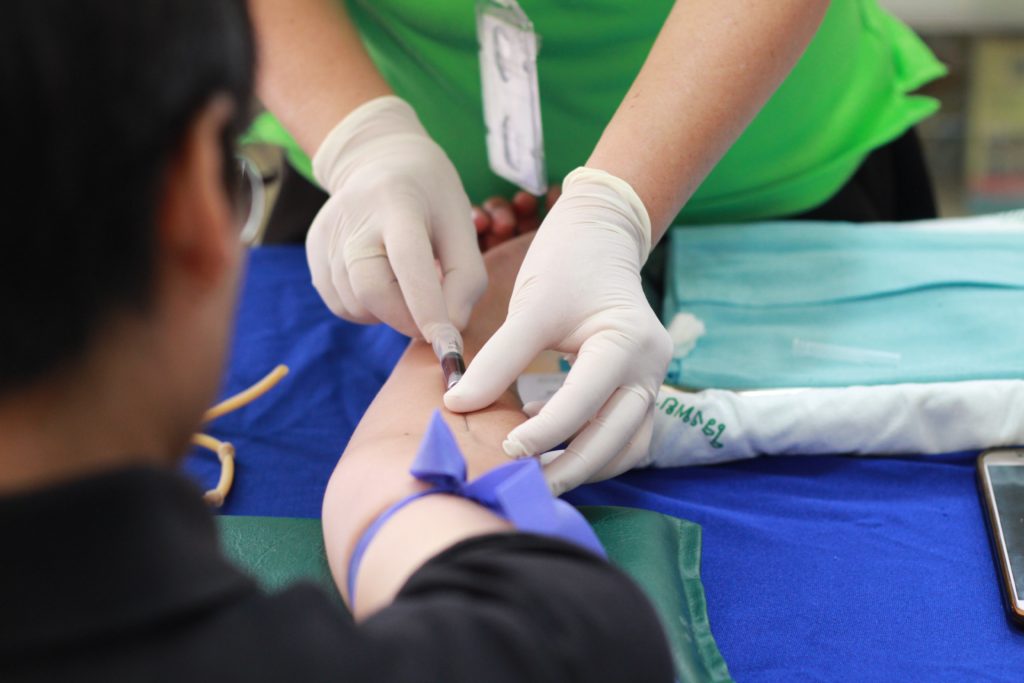Near the end of 2017, I had elevated liver numbers while I simultaneously began to lose response to Remicade without developing Remicade antibodies. The combination of these two red flags is a sign that there might be something deeper at play than just ulcerative colitis. A lot of the time, these signs point to a dysfunctional liver.
Read on to find out what my GI predicted the issue was and the testing I did to get answers.
2 Procedures to Get Answers About My Elevated Liver Numbers
But, before my GI jumped to any conclusions about the state of my liver, she scheduled me for two procedures to help search for answers: an abdominal ultrasound and a colonoscopy.
1. Abdominal Ultrasound
The purpose of the ultrasound was to scour my entire belly, analyzing every organ to try to identify any abnormality.
When I sat down for the procedure, I realized I was tense and nervous. I was worried about the ultrasound discovering something abnormal, and equally worried about what it would mean if it didn’t find anything.
How the Ultrasound Test Went
The technician spread the gel all over my belly and pressed the wand over each of my organs: liver, gallbladder, pancreas, spleen, stomach, kidneys.
While at it, she also checked my aorta and my hepatic portal vein—the blood vessel that carries blood from the GI tract, gallbladder, pancreas, and spleen to the liver.
I watched the grey-black images of my belly compress and rise with every inhale, hold, and exhale. The text on the screen was a foreign language to me, but her hands glided knowingly, seamlessly, to each keyboard button, snapping photos of my insides.
It tickled when she compressed the head into my ribs, and I was so thirsty from fasting that when I inhaled a chuckle, my dry throat clogged with the dry air. But if that’s what it takes to discover why my liver had elevated enzymes, it would be worth it.
The Ultrasound Results
One week later, I read my results on the online patient portal: “Mildly echogenic fatty liver. Normal appearing gallbladder and common duct.”
Wait, what?
Fatty liver didn’t sound good. But the fact that my gallbladder and duct appear normal was great news.
What is Fatty Liver?
My doctor explained that the excess fat in the liver is likely linked to the elevated liver enzymes. Though this fat abundance doesn’t necessarily mean you have a disease, it certainly can lead to liver problems down the road. For example, excess fat can lead to eventual inflammation, fibrosis, cirrhosis, and/or liver failure.
This whole time my liver enzymes were elevated, my GI was thinking I might have an autoimmune liver disease that’s associated with IBD called primary sclerosing cholangitis (PSC). Unfortunately, fatty liver is common in PSC patients.
Still, though, nothing was confirmed.
“We need to keep a close eye on this,” my GI doctor said. “We’ll get more info when we do your colonoscopy soon.”
The colonoscopy could not roll around fast enough; I was in desperate need of answers.
2. The Colonoscopy (And Its Results)
I went through my bowel prep and colonoscopy procedure without any issues. But when I woke up in the recovery room, my GI began talking to me and my parents about her concerns.
She informed me that my colonoscopy results were normal and reminded us about the excess fat in my liver.
Probable Diagnosis: Primary Sclerosing Cholangitis (PSC)
And that’s when she finally said it: “I think you have PSC. All the signs are pointing toward it. We’ll talk about it more next time you see me in clinic.”
We left the hospital with even more questions.
How does it relate to IBD?
How will it affect my short-term and long-term treatment plan?
How quickly does it progress?
My doctor suggested to NOT look it up online. On most sites, it’s portrayed as a disease filled with hopelessness and life-long complications, so be careful where you get your info. She assured us that there are medications out there that will stop it before getting anywhere near that point.
If you do want to read more about PSC, I’d suggest you read about it on the PSC Partners Seeking a Cure foundation’s webpage. The way they talk about PSC is filled with more hope and information.
The Comical Colon’s PSC Hub
You can read more about PSC in my PSC Hub of The Comical Colon! This section is dedicated to spreading awareness about PSC and sharing my story and other patients’ success stories using an off-label medication, vancomycin, to successfully manage PSC.
Related Posts
